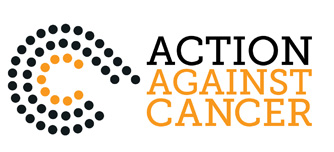Cancer 'off switch'
A new study has just been published with a breakthrough in a research programme funded by Action Against Cancer since 2011. The team at the University of Sussex have revealed that blocking a protein known as LMTK3 can prevent breast cancer tumours from turning immune cells into 'friends'.
In cancer, immune cells can be either 'friends' or 'foes', depending on the specific cell type and the tumour microenvironment (TME).
Now, scientists have discovered that high levels of LMTK3 in breast cancer cells can trick the body's defences - and that switching it off with drugs could turbo-charge immunotherapy by fighting tumour cells, thereby delaying or preventing spread and ultimately prolonging lives.
LMTK3 is also present in other parts of the body - including the lungs, thyroid, stomach, colon, ovaries and skin - meaning the findings could have positive implications on a range of cancers.
Lead researcher Professor Georgios Giamas from Sussex's School of Life Sciences said: “This research is another step towards unravelling the contribution of LMTK3 in cancer progression and the first one to link LMTK3 with an immunosuppressive tumour microenvironment.
“Our findings suggest that by targeting LMTK3, we can control tumour growth both directly by attacking the cancer cells and indirectly by modulating the signals that promote immune cell infiltration and their anti-cancer function."
The study, conducted by the Giamas Lab at the University of Sussex and the Zhejiang Chinese Medical University, and published in Molecular Cancer , has revealed that LMTK3 acts like a 'control knob' that changes the size and content of microscopic 'parcels' that cancer cells release to communicate with their surroundings.
These parcels - known as extracellular vesicles (EVs) - normally carry signals such as proteins, DNA and lipids, but when LMTK3 is highly active, they contain specific instructions that persuade incoming immune cells to stop fighting and start helping the tumour grow.
Researchers performed extensive studies in breast-cancer cells, including treatment with a molecule named C28, the first drug designed to block LMTK3.
Once the LMTK3 protein was shut down, the modified parcels lost their power to promote tumour growth, while immune cells, called monocytes, were able to enter the tumour and remained in attack mode rather than switching sides.
High levels of LMTK3 in patient tumours have long been linked to poorer survival. Scientists now believe the protein could serve two roles at once - both as a drug target and as a biomarker to help doctors identifywhich patients are most likely to benefit.
The group is now working with pharmaceutical partners to turn C28 into a medicine suitable for human trials and to create even stronger, more specific follow-up compounds. At the same time, pre-clinical studies are testing whether LMTK3 drugs can be safely paired with widely used 'checkpoint' antibodies that release other immune brakes.
The Giamas Lab, along with hospital teams, is also aiming to begin measuring LMTK3 levels in routine biopsy samples, hoping to match future drugs to patients' individual needs.
Action Against Cancer has been proud to fund Professor Giamas research into LMTK3 from the very beginning in 2011.
"It can be difficult to secure satisfactory funding to perform top quality research in the cancer field as it is highly competitive. Action Against Cancer has provided the funding enabling me to conduct my research at the highest level.
The continuous support from the late founder Hilary Craft and the other Trustees has inspired and motivated my personal development. It would not be an exaggeration to say that I have reached a professional level, which would have taken another five or more years without the charity's support. I am, have been and will always be extremely grateful to Action Against Cancer." Professor Georgios Giamas.
Back to 'News and Events' main menu

Other News and Events

Celebrities support AAC!
Action Against Cancer Ambassadors Julian and Cat O'Dell's live music fundraiser event Catfest has been a huge success over the past few years... Read more
Fundraise from your Facebook page!
You can now raise vital funds for life saving research right from your Facebook page. This is a really effective way to fundraise and is super easy... Read more
Big step closer to new drug
One of the first projects Action Against Cancer funded after establishing as a charity in 2011 resulted in the discovery of a cancer... Read more
